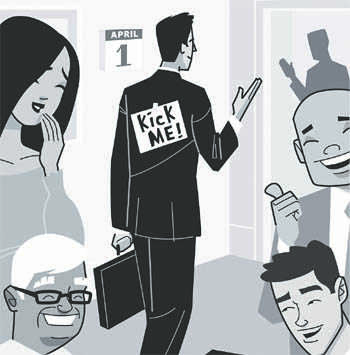This April Fools' Day, if there is one story that one wished was a joke was India losing to the West Indies in the World T20 semis in Mumbai. Alas! There was no scope for gullibility in that, having lived through the heartbreak at the live telecast earlier, even as the Indies' won hearts with their superb play. But, yes, the media has for long played pranks on the audience on April 1. Gullibility is when a person is easily persuaded to believe something. It descends from the verb gull, meaning 'to deceive or take advantage of.'
In 1957, BBC reported that Swiss farmers had harvested a spaghetti crop. The gullible called in to know the trick as footage of people plucking noodles from trees was telecast. Soon they realized that that they had been tricked. In 1996, when fast-food restaurant chain Taco Bell announced that it would buy Philadelphia's Liberty Bell and rename it Taco Liberty Bell, it failed to ring a bell among the credulous folks who would have no tinkering with their city's landmark.
The earliest recorded April Fools prank was in 1698. Rumours were spread in London that lions would be washed at the Tower of London on April 1. Several unsuspecting citizens showed up, only to see that that they had been hoaxed. The ruse was repeated for years, much to everybody's amusement.
The origins of All Fools' Day remain a mystery, though it has been celebrated for centuries. Some believe that it dates back to 1582, when France switched from the Julian calendar to the Gregorian calendar. Since it was not the Internet era, people were slow to get the news that the New Year had moved to January 1. They continued to celebrate it during the last week of March through April 1 and became the butt of jokes and hoaxes.
Another school of thought says that it was Geoffrey Chaucer who first recorded the association between April 1 and foolishness in his "The Canterbury Tales" in 1392. I recall my MA (English) days and studying Chaucer's work in the 'Middle English' class. Chaucer was the first to notably dabble in fun, taking gaiety to the common man; it was no longer the stuffy diversion of the upper class. The chapter "Nun's Priest's Tale" is set "Syn March bigan thritty dayes and two" (32 days after March began, ie April 1).The story goes thus: Chauntecleer, a proud cock who is a peerless singer, is tricked by Russell, fox "ful of sly iniquitee" by playing to his inflated ego. The fox coaxes the rooster to sing for him. Chauntecleer puffs out his chest, beats his wings, closes his eyes, and stretches out his throat, and just as he begins to sing, Russell darts and grabs him by the throat. All the farm animals run after the fox. The cock, with a presence of mind, suggests to the fox to taunt his pursuers. And then, as soon as the fox opens his mouth to do so, Chauntecleer escapes from his jaws and flies into a tree. The fox tries to flatter the rooster again, but in vain. The moral of the story, says the Nun's Priest, is never to trust flatterers.
Today, there are so many examples of gullibility in literature. The famous fairy tale character Pinocchio is a naive puppet who is repeatedly duped by other characters; Little Red Riding Hood, after being deceived by a wolf, learns to feign gullibility in order to deceive a second wolf. In "The Emperor's New Clothes", the emperor and his staff are swindled, even as the crowd displays credulity in believing in the invisible cloth. The tragedies of Shakespeare's characters Romeo and Juliet, Othello and Macbeth can be traced mainly to their gullibility.
Well, as long as the jokes are not injurious, they lend fun. Fun must not be schadenfreude (German, literally 'harm-joy') which is pleasure derived from the misfortunes of others.
In France, paper fish is placed on the preys' backs who are then referred to as "poisson d'Avril" (April fish) when the prank is discovered, much like we shout out "April Fool!" The easily caught fish symbolizes a gullible person.
Merriam Webster Dictionary says that among the strongest motivations for looking up a word in the dictionary is to prove that someone else is wrong about a word. Another is to answer the question: "is that word really in the dictionary?" These two powerful reasons combine on April Fools' Day every year, and it is seen that gullible is looked up many times, as the dictionary becomes the punchline of a joke that's been told and retold but finds new naïve victims every year: "Did you know that gullible isn't in the dictionary?"
Perhaps, Mark Twain got us all bang on when he said: "April 1. This is the day upon which we are reminded of what we are on the other three hundred and sixty-four."
hkhetal@gmail.com
Unlock Exclusive Insights with The Tribune Premium
Take your experience further with Premium access.
Thought-provoking Opinions, Expert Analysis, In-depth Insights and other Member Only Benefits
Already a Member? Sign In Now










